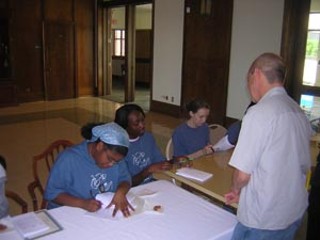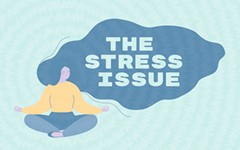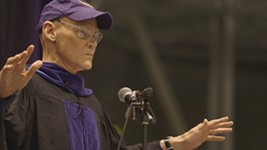Write of Passage
As Austin upstart Badgerdog Literary Publishing prepares to relaunch 'American Short Fiction,' it's preparing high-needs students to express themselves on the printed page
By Nora Ankrum, Fri., May 13, 2005

Photo courtesy of Carrie Fountain
"What do you do with that kid," asks Stephanie Czarnota, "and I was that kid – what do you do with that kid who doesn't want to do sports, is not really interested in drama, who just likes to kind of jot down things in a notebook?" As program manager for Badgerdog's afterschool program Youth Voices in Ink, Czarnota believes she's found the answer: You publish that kid. And now the fun doesn't have to stop at the end of the school year. To raise funds for YVI, Badgerdog has launched a tuition-based camp (though there are two scholarships available) modeled after YVI's workshops and open to third- through 12th-graders (older kids go to Badgerdog camp, while the youngest attend Camp BadgerPup). Beginning June 6, the camp runs in three-week sessions, includes field trips, and culminates in a published anthology of campers' works, along with the requisite readings and booksignings. For more info, visit www.badgerdog.org.
In 2003, Melanie Moore bought a defunct publication with plans of reviving it to its former glory. It was the beginning of her crusade to repopulate the world with those brilliant but often short-lived and rarely solvent vertebrae that make up the backbone of the fiction writer's career: the literary journal. Two years later, the journal is still in the works, but it has spawned a children's writing program so successful it's got a waiting list 28 schools long. Quite simply, in the words of AISD program administrator Ruth Becker, "There is nothing else like it."
When Moore bought American Short Fiction from UT Press, she basically acquired the name, the print backstock, and the old subscriber list. In the prestigious journal's short lifetime (1991 to 1998), it had earned, among other accolades, a Pushcart Prize, two National Magazine Award nominations, and a spot in 1992's Best American Short Stories. These achievements, of course, Moore couldn't buy. But they would perhaps be easier to replicate than with a brand-new publication, given ASF's built-in fan base. Besides, Moore didn't have time to start from scratch. She aimed not only to replicate ASF's success but then to replicate that replication with other beloved but defunct journals. "Which should be easy enough to find," she reasoned. "As many as 30 journals go out of print each year." The hard part would be keeping them afloat.
With lack of funding sending so many literary journals the way of the ivory-billed woodpecker, Moore needed an innovative way to finance her dream. She found it in forming a nonprofit – Badgerdog Literary Publishing – which would have a magical and beautiful thing called a double bottom line. There's a financial bottom line, explains Moore, and "there is also a social bottom line that must be met as well in terms of contribution to society. ... Thus, it seemed that we should incorporate a program to foster the growth of every next generation of writers."
With the rebirth of ASF still just a twinkle in her eye, Moore formed Youth Voices in Ink, an afterschool creative writing program that would meet Badgerdog's social bottom line and give a whole new meaning to Moore's mission of providing writers the opportunity to have their voices heard. Now she'd be giving would-be writers the opportunity to have a voice, period. "YVI achieved such momentum during the pilot," Moore says, "that we pushed back the work on ASF to meet the demands."
Youth Voices in Ink began in spring 2004, partnering with Austin-area schools as an afterschool workshop. While YVI is an educational program, giving students more individual attention and writing practice than they might otherwise have, the strengths of the program are firmly rooted in those of Badgerdog, which is, at its heart, a publishing house. That means that each 10-week workshop culminates with a published anthology of students' works – and by "published," they don't just mean photocopied and stapled together.
YVI aims to demystify the writing process, especially the notion that writers, unlike people in other professions, are created in a vacuum, scribbling away in a hovel all by themselves before suddenly publishing something brilliant. Workshop students take part in the publishing process, from revising, working with editors, and reviewing galley proofs to participating in public readings and signing autographs – just like, as Moore puts it, "professional writers." The resulting anthologies are then available for sale to the public just like any other literary journal. "Like in soccer or band," Moore says, "students need to have an endgame where they show their skills."
What with all the "endgames" and "double bottom lines" being thrown around at Badgerdog, you can easily forget it's an organization run by poets and fiction writers, but the lack of flowery language only highlights the organization's main focus: giving students concrete results for their hard work. "You tell the kids, 'You have a voice.' It kinda goes in one ear and out the other," says Reagan High English teacher Angela Gatto, whose experience as a YVI partner teacher – recruiting students to the program and sitting in on the workshops – has inspired her to start a creative writing elective and a literary anthology at her school. "But when they first see their poem or their piece of writing in a book in black and white that's being distributed to other people – that's really what made the change."
Through publishing students' works, YVI hopes to give kids access to the elusive tools of the writer's trade: skills and practices beyond just putting the words down on the page; living, breathing mentors; and a community of writers. With this in mind, they recruit writers rather than teachers to lead the workshops, pulling from the Michener Center and the UT and Texas State MFA writing programs. Johnston High School partner teacher Dorothy Winburne believes the program's success lies in these workshop leaders' approach: "They haven't come in like, 'We're here to teach you.' They've come in like, 'We are writers together. I've just been writing longer than you have.'"
It might seem counterintuitive that YVI takes struggling students headed like lemmings toward their TAKS exams and tells them to write poetry as they go. In the high-needs schools YVI serves, many of the students read at a level far below what they should. Some don't speak English. Others might be "low achievers" or "problem kids" or simply "likely to fall through the cracks." But according to the teachers and administrators who've seen the program in action, the lessons learned after school are making their way into students' everyday classrooms, not just improving their writing skills but helping them gain self-confidence and reinforcing the curriculum.
Winburne has partnered with YVI since its pilot semester, when she taught at Webb Middle School. "Badgerdog saved my life," she says. "This is the way every child should have the opportunity to learn." During that first semester, she and workshop leader Farid Matuk witnessed one of the most dramatic stories to come out of the program. Winburne recruited a student who didn't want to write at first, but every class began with a 10-minute sustained writing exercise, always starting with a prompt, and on the day that the prompt was "My mother ... ," the student started writing, and she didn't stop at 10 minutes.
"She actually didn't stop writing for the whole hour and a half," Matuk remembers. "What came out of that was page after page of a journal entry about her mother having abandoned the family. ... Through those pages she was able to ... tell the story again and again through these different scenes." As it turned out, the student's father had been trying unsuccessfully for years to get her to speak about her mother's abandonment. Through the workshop, Matuk helped the student revise her work into a poem. "I've read that poem again and again to adult audiences," Matuk says, "and every time it just leaves the room in silence."
This spring's community reading took place at St. David's, where kids from the program's participating middle and high schools came together to read for parents, friends, and strangers alike. Most of the students had published poems; one had published an excerpt of a play. Some had written introductions for themselves that showed as much humor and savvy as their poetry. Others had written very personally, while still others had written playfully.
Sixth-grader Laura Monroy read so softly that only the words "stinky" and "cowpie" were audible. Reagan High senior Carlotta Hamilton surprised the whole room when she broke out in song. And 15-year-old Samuel Velasco read his stunning poem in Spanish, which his workshop leader then translated into English: "... you are that forbidden love/and today forgetting goes, agonized,/you are like an angel fallen/from the sky, your hands/are like those of a mannequin, if I could/with your hands I'd bring down the sky for you/in pieces, if I could, with your voice/I'd make myself a song of love ..."
As Youth Voices in Ink enters its fourth semester this fall, American Short Fiction will be nearing its December debut publication. Despite the roundabout journey Badgerdog has taken to get AFS to the point where it is now, with a board of advisers, an editorial board, and finally a respectable dent in its sizable slush pile, the upstart nonprofit turns out never to have strayed too far from its original purpose. As ASF Editor Rebecca Bengal puts it, "What you look for as an editor is that rare new story; you want to discover someone unknown and have the opportunity to be the first to publish their work." Rather than sit back and wait for that rare new story, Badgerdog has simply figured out a way to go out into the world and find it. ![]()








